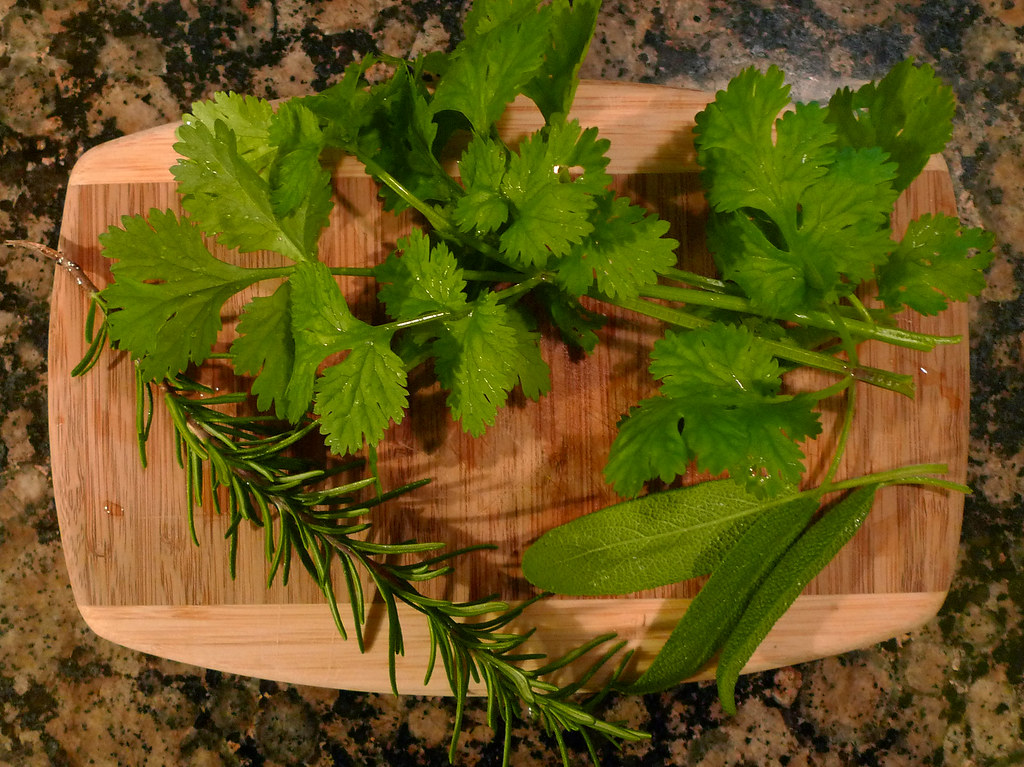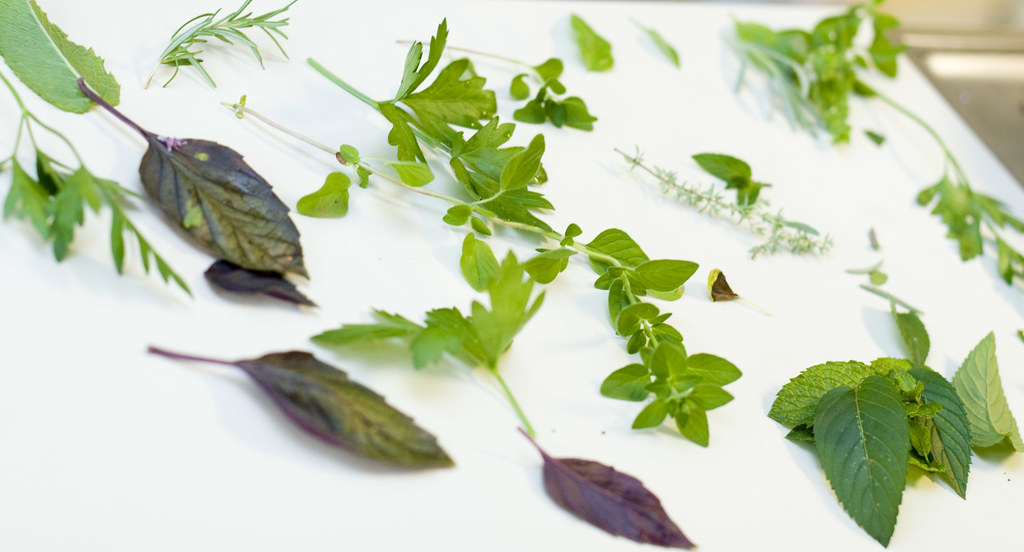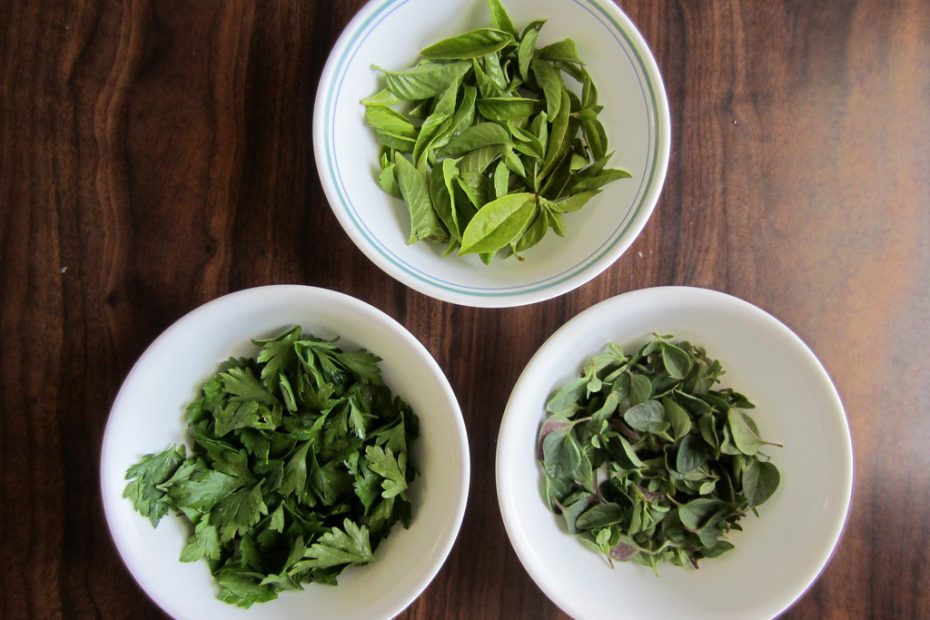Storing your freshly cut herbs is much easier when they are dried. I’ve gone through this process multiple times and always wondered if I should perhaps wash garden herbs before I dry them. But I didn’t want to damage them or add moisture before drying, so should herbs be washed before drying?
Herbs should be washed before drying to remove any dirt, bacteria or pesticides. It’s best to wash herbs under cool running water for 2-3 minutes and then remove any excess moisture before drying.
We’ll go over the exact steps to wash your herbs before drying them, the benefits of doing and the difference between hard and soft herbs in the process. Lastly, I’ll share some tips from personal experience on how to prepare washed herbs for drying.
Benefits of washing herbs before drying
Washing your herbs before drying not only removes any unwanted dirt from the leaves and stem but can also prevent us from ingesting more harmful substances like pesticides or unwanted bacteria.

Depending on where you got your herbs it might be more or less necessary to give them a good rinse. Nonetheless, a quick washing under cool water will likely do more good than harm. Here are some of the benefits of washing herbs before drying:
- Removes dirt and other remains: Washing herbs removes dirt and soil, obvious right? Well, not so much. Even if your herb leaves look like they are in pristine condition they may contain microparticles of dirt invisible to the human eye. Although not necessarily harmful they can downgrade the taste of dried herbs.
- Gets rid of unwanted bacteria: Bacteria are everywhere, some are good, some are bad. Unfortunately, there is no way of knowing just by looking at fresh herbs. Although washing herbs may not get rid of all bacteria it can certainly reduce the number of bad bugs that have accumulated on the leaves.
- Lowers exposure to pesticides: Here’s something that was new to me, even organic herbs can be sprayed with pesticides. The difference is that organic pesticides have to be water-soluble. Thus, washing organic fresh herbs will make sure you are not ingesting any pesticides after they’ve dried.
Believe it or not, there is even a difference in what herbs to wash and how to handle them before drying. In the next section, we’ll look at what herbs to wash and how to deal with hard and soft herbs before drying.
What herbs should be washed before drying
All herbs should be washed before drying to remove excess dirt, bacteria and pesticides. However, hard herbs should be treated very differently from soft herbs. Knowing the difference before commencing the washing procedure can avoid damaging the herb before drying.
Washing hard herbs
Hard herbs are those that typically survive winters. They have woody stems and are much more resilient to cold, strong winds, and heavy rain. When used in cooking, hard herbs tend to retain their flavor throughout the cooking process and as a result, are frequently added at the beginning of meal preparation.
When washing hard herbs they can be rinsed by hand in cool to lukewarm water. They can tolerate stronger water streams and warmer water temperatures. In addition, hard herbs can be placed in a salad spinner without much damage to shake off excess moisture before drying.
Such hard herbs include:
- Rosemary
- Sage
- Thyme
- Oregano
- Bay
Washing soft herbs
Soft herbs are much more delicate and will much easier die off in colder temperatures. Their stems are green and nimble and can more easily break under rough environmental conditions. In cooking, these kinds of herbs are usually used at the end to finish the dish and add some additional flavor.

Washing soft herbs requires a slightly more refined process as they have to be handled with great care to avoid damage. It’s best to gently stir them by hand in a large bowl of cool water for 1-2 minutes. To remove moisture before drying I recommend carefully tapping the leaves and stem using a paper towel.
Such soft herbs are:
- Basil
- Coriander
- Dill
- Marjoram
- Parsley
- Tarragon
I’ve come up with a simple 3-step process for washing herbs before drying. I’ll go over exactly what I do when washing my garden herbs next!
How to wash herbs for drying
Preparing herbs for drying is as simple as removing obvious unwanted elements from the plant, rinsing the herb under cool water, and then making sure to get rid of any moisture. Once you’ve completed all three steps the herbs are ready for drying.
- Remove unsavory elements: Unsavory elements are any that can be spotted just by inspecting the stem and leaves for dark spots, mold, insects, insect eggs, and wilted leaves. I do this every time before using fresh herbs in cooking and before drying them.
- Rinse under cool water: Rinse the entire plant under cool water and remember the difference in handling hard and soft herbs. Soft herbs are preferably gently stirred in a bowl while you can use harder water streams to clean hard herbs.
- Get rid of moisture: Getting rid of the water that accumulated on the plants’ leaves from washing is the third and crucial step that is often overlooked. Failing to do so can result in moldy or brown spots on dried herbs. Use paper towel towels for soft herbs and salad spinners for hard herbs to dry your herbs before drying. 😉
Conclusion
Washing fresh herbs before drying is essential for healthy and delicious dried herbs. The end result can only be as good as the starting ingredients, as such, taking the extra time to prepare your herbs for drying can make a big difference.
Although I usually prefer my herbs fresh from the garden, I will occasionally dry a few twigs for a change in flavor and texture. With some herbs such as oregano and thyme, the flavor even seems to intensify when drying. So go ahead and experiment with washing and drying herbs, but most of all enjoy the process 🙂
“Herbs (147)” by azmichelle is licensed under CC BY-NC-SA 2.0; “Fresh herbs, yo” by Shawn Allen is licensed under CC BY 2.0; “Herbs from the garden” by IcronticPrime is licensed under CC BY-ND 2.0
- Are Herbs Perennial? - January 29, 2021
- Can Herbs Survive Winter? - January 28, 2021
- Can Dogs Eat Herbs? - January 27, 2021
